5 ETFs Set to Outperform S&P 500 With September Rate Cut on the Horizon
2024.07.17 07:49
Be honest. I won’t be mad, but just admit it.
You’ve got some SPY in your portfolio. So much, you’re probably trying to quickly change the subject from the SPDR S&P 500 (NYSE:).
I’m not mad. (I’m just disappointed—ha!) We refer to SPY as “America’s ticker for a reason.” It is everywhere.
Holding SPY has worked out this year. But we’re now at an inflection point, so we are having this conversation.
Only three stocks account for 21% of the . Apple, Nvidia and Microsoft determine the entire market’s moves! This trio is tired. The “S&P 3” need a rest.
Which means money is about to flow into the forgotten 497. (Technically, the overlooked 500 as the S&P 500 actually contains 503 stocks. We contrarians appreciate these nuances.)
Let’s discuss five dividend payers that are likely to lap SPY between now and the end of the year. Unlike the tired tech names, these “boring” dividends are due for a rally.
They are utilities. And I’m most interested in them because sometimes income investing is just that simple. Utility stocks are “bond proxies” that benefit directly from falling rates. When rates drop, the ‘utes rally:
When Rates Decline, Utilities Rally
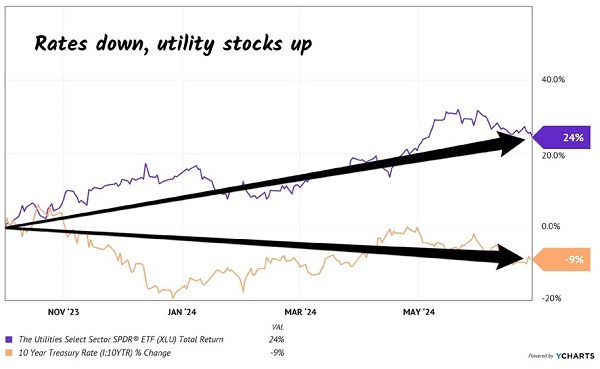
The purple line is Utilities Select Sector SPDR ETF (NYSE:), the utility fund that basic investors and money managers buy. Over the past year, XLU rallied 24%. The catalyst? A lower , which eased from 5% to 4.2%.
Utility stocks became so hot in May that mainstream pubs like The Wall Street Journal proclaimed them a “hot bet on AI”—ha! The narrative? Skyrocketing demand for electricity to support AI algorithms would benefit utilities. A connection so loose it’s laughable.
Aren’t lower rates the real driver of the move in the ‘utes?
With the Federal Reserve set to cut rates sooner rather than later, utilities remain a best buy right now—before they grab attention.
Another 0.8% decline in the 10-year yield could bring another terrific 24% price pop for the ‘utes.
But rather than buy vanilla XLU and its 3.2% yield, we’ll supersize our dividend. Let’s begin with Cohen & Steers Infrastructure Fund (NYSE:), my “go-to” ticker for utility and infrastructure stocks. It pays 7.8% and gives us instant exposure to 242 terrific names, including American Tower, The Southern Company and NextEra Energy.
Sometimes, we are fortunate enough to snag UTF at a discount to its net asset value (NAV). Today, it trades at par. Take UTF anytime it’s at par or below because its NAV will gain as rates decline.
Reaves Utility Income (NYSE:) is a similar play. UTG yields a bit more at 8% and also trades at par. UTG focuses on higher-yield plays, so it uses less leverage (20% versus 30% for UTF) to deliver its elite 8% dividend.
UTG’s premium is familiar territory. The fund’s markup has wandered as high as 13% in recent years! We could see “premium expansion” happen again, with falling rates providing a nice boost for its underlying holdings.
DNP Select Income (NYSE:) is another fund that owns electric utilities and dishes an even bigger dividend. The fund is popular with income investors because it pays a monthly 6.5-cent dividend that nets out to a nifty 9.2% annually.
DNP often trades at a premium to its net asset value (NAV). In fact, earlier this year, it fetched a 31% markup! In other words, investors were paying $1.31 for a dollar in assets. Not us!
But now, thanks to the recent pullback in utilities, DNP’s premium is down to 4%, which may be as low as we see it this cycle. We like it.
Looking for individual utility plays? Here are a couple of ideas to cherry-pick:
Dominion Energy (NYSE:) lowered its dividend back in 2020 and has been in the doghouse since. The “dividend magnet” works both ways. After Dominion cut, its stock price was eventually punished. But the selloff looks overdone, and this utility has some upside to catch up with its payout:
Dominion’s Dividend Magnet is Due
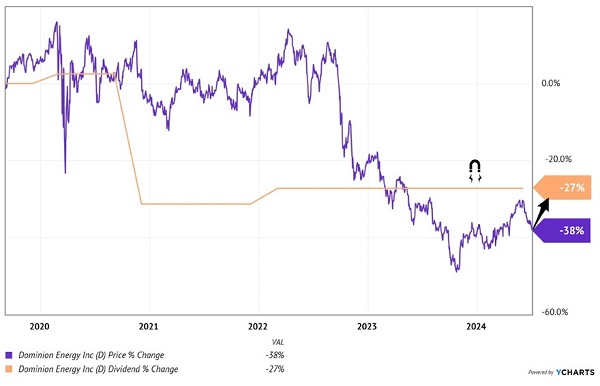
Why the 2020 chop? Too much debt, of course. Dominion had embarked on an acquisition binge in the name of growth. Which, ironically, backfired.
The result was a rare payout slash from a utility—an income investor’s worst nightmare. That’s why first-level investors keep Dominion in the doghouse today.
Which intrigues us here at Contrarian Outlook. Chief financial officers (CFOs) are like carpenters. It’s best if they measure twice and cut only once.
As a result, the safest dividend is often the one recently cut. Unless management is a complete clown show, the last thing they want is to have to cut twice. They don’t have the nose for it!
Meanwhile, American Electric Power (NASDAQ:) is a “dividend magnet” favorite. This regulated utility boasts 5.6 million customers across 11 states.
“Regulated” means AEP has a “high floor” in terms of earnings because regulators approve rates that afford utilities enough profits to serve customers without gouging them. These profits grind higher and higher.
AEP recently reached a deal with activist investor Carl Icahn for two board seats. Icahn, surely, was attracted to the company because of its consistent earnings growth. Since 2010, AEP has compounded its earnings by 5% per year and recently accelerated to 6.5%:
AEP Earnings and CAGR
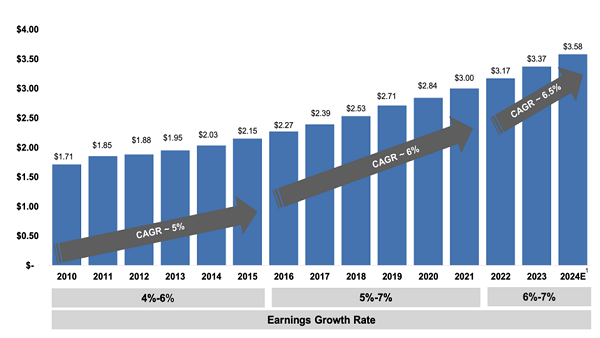
AEP is a “pure play” on dividend growth. Over the past decade, the company’s dividend has catapulted 76% from $2.00 to $3.52 per share:
AEP: A Steady Dividend Grower
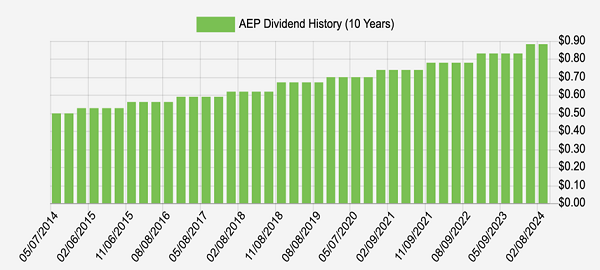
Source: Income Calendar
About that 76% dividend climb, AEP’s stock price 45% rise lags the divvie. That’s one reason for spicey upside we rarely see from a utility. As rates cool down, AEP’s dividend magnet could really pull shares higher:
AEP’s Dividend Magnet is Due
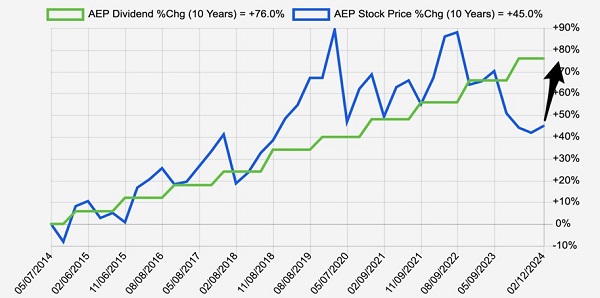
Source: Income Calendar
AEP’s earnings always rise. Its payout always climbs. Its stock price overshoots and undershoots its dividend, as stocks do. But, over time, its price rises with its payout.
Disclosure: Brett Owens and Michael Foster are contrarian income investors who look for undervalued stocks/funds across the U.S. markets. Click here to learn how to profit from their strategies in the latest report, “7 Great Dividend Growth Stocks for a Secure Retirement.”








